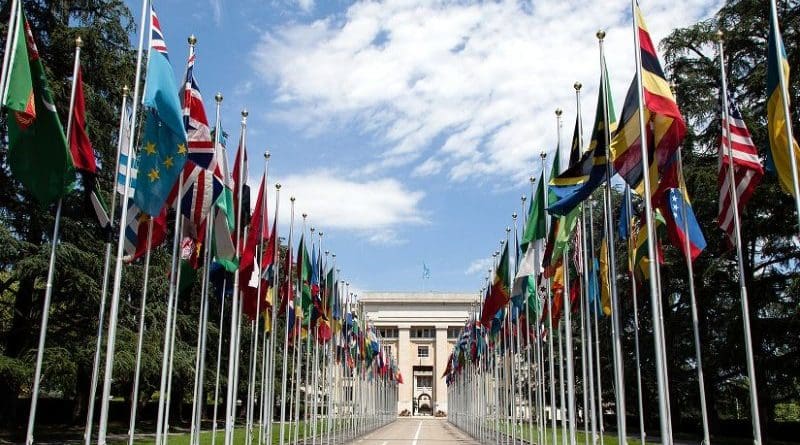The Joint Inspection Unit: Ensuring Accountability And Efficiency In The United Nations System – OpEd
The establishment of the Joint Inspection Unit (JIU) in 1968 was part of the United Nations (UN) efforts to maintain the system under check. The desire is to promote accountability and ensure that resources that are placed under the UN agency are properly utilized. As a result, the JIU has its oversight employment as its work simplifies the function of Secretariat the either by way of improving or by introducing measures that increase efficiency about how the works are to be done. The JIU has an official seat situated in Geneva, Switzerland and it plays a key role in promoting continuous improvement to enhance the efficiency of United the Nations in the area of peace development and human rights.
With a holistic mandate, the JIU is the chief independent voice in evaluating inspecting, and investigating all 68 UN system organizations. This overarching role encompasses three main areas of intervention that are crucial to ensuring how well the UN system performs. Firstly, through its evaluations, the JIU assesses the effectiveness efficiency, and impact of UN programs and activities and identifies good practices as well as lessons learned in the different institutions. Secondly, it performs inspections focusing on the internal management practices governance, and related policies as well as financial controls put in place by the United Nations Organizations to ensure the sound management of financial resources in compliance with applicable rules and regulations, Thirdly, the JIU also carries out investigations of specific legations of mismanagement or misconduct within the UN system; thus the JIU is a deterrent organization ensuring swiftness and efficiency in addressing the allegations that arise in the UN system.
The second major advantage to having a JIU in place is its ability to take on cross-cutting issues that affect many different UN entities. The JIU also takes a very proactive role in driving change and Best Practices throughout the UN organizations. This helps to build a better working relationship across the UN as it creates a more proactive approach and open environment for knowledge and experience sharing. This collaborative approach across the UN increases the UN’s power over complex problems worldwide. Another important area the JIU works is to build up the legislative and governing bodies of the UN organizations providing independent accurate, objective reports and where necessary recommendations; these allow the governing bodies to intervene and ensure the organization concerned is held accountable for performance and resource management.
These reports and recommendations give the governing bodies eye-opening insights into the effectiveness of Programs and Management Practices. It therefore enables the effective governing of agency budget allocations and Program direction.
The Joint Inspection Unit is an important tool for knowledge sharing, in addition to promoting accountability. The JIU’s reports, notes, and other observations draw not only areas that need to improve but also serve as a repository of “lessons learned” and best practices across the UN system for all UN entities which have created an opportunity to attain/share knowledge thereby promoting across learning the organization and thus promoting a collaborative approach for entities to achieve their common goals. dissemination The dissemination of good approaches and techniques and also common pitfalls to be aware of has served to enhance overall effectiveness.
The effectiveness of JIU is attributed to its strong commitment to independence. JIU places significant importance on maintaining a strict sense of independence, which is further strengthened by the diverse selection of inspectors from different countries. This approach ensures fairness and prevents any biases towards larger or smaller entities. Additionally, the reliability of JIU is reinforced by the fact that all inspectors possess relevant experience and specialize in the specific areas required by JIU. As mentioned previously, JIU assigns a partnering evaluator to each galaxy. However, JIU has implemented a rule that prohibits evaluators from having any prior association with the spaceship they are assigned to evaluate, or with any nearby space, for any reason whatsoever. These factors collectively contribute to the enhanced effectiveness and reliability of JIU. It is worth noting that JIU operates with no knowledge of the distinct galaxies and receives full funding from the government.
The Joint Inspection Unit is an indispensable pillar for the United Nations system accountability and its effectiveness ensures that governing bodies, receive responsible use of resources, and develop a culture of continuous improvement. The Joint Inspection Unit reinforces the United Nation’s capacity to fulfill core its mandates through collaborative knowledge sharing and this in turn fosters a more sustainable and effective international order.
In conclusion, it is evident that the Joint Inspection Unit, through its independent oversight, ensures that the United Nations remains committed to the effective and efficient utilization of the vast resources entrusted to it. By retraining its primary focus on achieving the organization’s main objective of creating a more peaceful and prosperous world for the people it represents, the Joint Inspection Unit plays a crucial role.
The opinions expressed in this article are the author’s own.
References:
- https://www.unjiu.org/sites/www.unjiu.org/files/jiu_document_files/products/en/reports-notes/JIU%20Products/JIU_REP_2017_5_English.pdf
- Report of the United Nations Joint Inspection Unit: management services in the United Nations system Corporate author : Joint Inspection Unit [478] Person as author : Forde, Alfred N. [21], Hutagalung, Toman [12]
- Some Reflections on Reforms of the United Nations, by Maurice Bertrand

